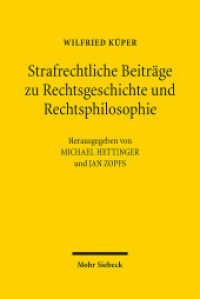- ホーム
- > 洋書
- > 英文書
- > Religion / Ethics
Full Description
Amidst the global resurgence of the theologia crucis—theology of the cross—both in academic circles and in the world of pastoral/practical ministry, this book explores the subject from the Indian context, particularly from an evangelical perspective. By repositioning evangelical to mean "gospel affirming," the author argues that theologia crucis refers to the Christ-event as a whole and not just the event of the cross. Such a reading opens the space for creative, constructive, and promising prospects of addressing the evangelical concerns of authority, identity, activity, and self-criticality. After outlining the development of Christian Staurology in the Indian context, the author discusses three trajectories of theologia crucis. Following this, he traces the contours of an evangelical reading of theologia crucis, demonstrating how it disrupts normative interpretations of the cross by envisioning a reconciliative God and cross, leading to the articulation of humanitas crucis—the humanity of the cross. By way of implications for public engagement, the author discusses how evangelical theologia crucis helps in envisioning ideas like reconciliative justice, reconciliative political will, reconciliative solidarity, and reconciliative community, especially in relation to the politically violent context in India.
Contents
Introduction
Chapter 1 Evangelical Disruption and Gospel Affirmation
Chapter 2 Outlines of Indian Staurology from a Historical-Theological Perspective
Chapter 3 Hermeneutical Trajectories of Theologia Crucis in the Indian Context
Chapter 4 An Evangelical Hermeneutic of Theologica Crucis
Chapter 5 Evangelical Theologia Crucis and Public Engagement
Conclusion
Bibliography








